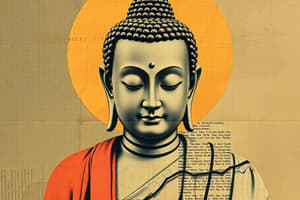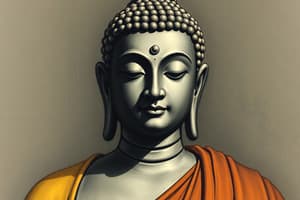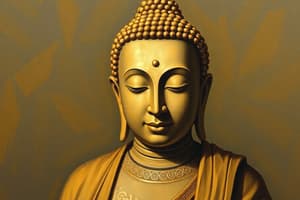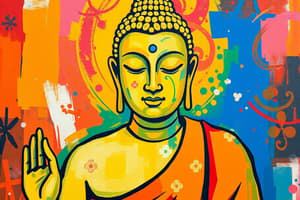Podcast
Questions and Answers
Why did Confucius die feeling like a failure?
Why did Confucius die feeling like a failure?
He never achieved a high position in government.
What does the term 'Mahayana' mean in Buddhism?
What does the term 'Mahayana' mean in Buddhism?
The greater or larger vehicle.
What unique action did one of Confucius' disciples take after his death?
What unique action did one of Confucius' disciples take after his death?
He lived at Confucius' grave in a hut mourning for approximately three years.
Which denomination of Buddhism is described as a 'museum piece of the past'?
Which denomination of Buddhism is described as a 'museum piece of the past'?
What did Confucius believe education should aim to achieve?
What did Confucius believe education should aim to achieve?
List the '6 Arts' or '6 Disciplines' Confucius believed everyone should learn.
List the '6 Arts' or '6 Disciplines' Confucius believed everyone should learn.
When was Mahayana Buddhism officially founded?
When was Mahayana Buddhism officially founded?
What is the central tenet of Zen Buddhism?
What is the central tenet of Zen Buddhism?
What was Confucius' view on the qualities of government officials in his time?
What was Confucius' view on the qualities of government officials in his time?
What do 'koans' represent in Zen Buddhism?
What do 'koans' represent in Zen Buddhism?
How did Confucius view the caste system in relation to government service?
How did Confucius view the caste system in relation to government service?
What is the core purpose of life according to Confucian thought?
What is the core purpose of life according to Confucian thought?
What is the primary focus of Pure Land Buddhism?
What is the primary focus of Pure Land Buddhism?
In Tibet, what do many Vajrayana Buddhists call their religion instead of 'Buddhism'?
In Tibet, what do many Vajrayana Buddhists call their religion instead of 'Buddhism'?
What does the saying 'You’re Confucian at Work, Taoist on Weekends, and Buddhist at Death' convey?
What does the saying 'You’re Confucian at Work, Taoist on Weekends, and Buddhist at Death' convey?
Which Buddhist denomination treats their scriptures with great reverence?
Which Buddhist denomination treats their scriptures with great reverence?
What is the primary purpose of mirrors in Shinto?
What is the primary purpose of mirrors in Shinto?
What do Shinto practitioners typically do before praying?
What do Shinto practitioners typically do before praying?
What are 'matsuri' and what is their primary purpose in Shinto?
What are 'matsuri' and what is their primary purpose in Shinto?
What is the most important work of Shinto priests and priestesses?
What is the most important work of Shinto priests and priestesses?
Who do practitioners of Shinto trace everything back to?
Who do practitioners of Shinto trace everything back to?
What does 'bushido' refer to in Shinto, and what are its seven components?
What does 'bushido' refer to in Shinto, and what are its seven components?
Is Shinto considered pessimistic or optimistic, and what reflects this view?
Is Shinto considered pessimistic or optimistic, and what reflects this view?
Why did Shinto cease to be the state religion of Japan after WWII?
Why did Shinto cease to be the state religion of Japan after WWII?
What is the significance of the Arabic language in relation to the Qur'an for Muslims?
What is the significance of the Arabic language in relation to the Qur'an for Muslims?
How do Muslims view translations of the Qur'an in languages other than Arabic?
How do Muslims view translations of the Qur'an in languages other than Arabic?
What are the three duties of practicing Muslims regarding the Qur'an?
What are the three duties of practicing Muslims regarding the Qur'an?
Before interacting with the Qur'an, what ritual cleanliness must Muslims perform?
Before interacting with the Qur'an, what ritual cleanliness must Muslims perform?
What is the Arabic term for 'traditions' associated with Muhammad, and what do they include?
What is the Arabic term for 'traditions' associated with Muhammad, and what do they include?
What are the Five Pillars of Islam?
What are the Five Pillars of Islam?
What determines whether an act in Islam is accepted by God?
What determines whether an act in Islam is accepted by God?
How do Sunnis and Shiites differ in their daily prayer practices?
How do Sunnis and Shiites differ in their daily prayer practices?
Which Christian tradition believes that the Holy Spirit proceeds from the Father only?
Which Christian tradition believes that the Holy Spirit proceeds from the Father only?
What is meant by the 'Double Procession' of the Holy Spirit?
What is meant by the 'Double Procession' of the Holy Spirit?
What major theological conflict in the 4th century led to the Council of Nicaea?
What major theological conflict in the 4th century led to the Council of Nicaea?
What were Arius's two main reasons for rejecting the 'co-equal' and 'co-eternal' nature of the Father and Son?
What were Arius's two main reasons for rejecting the 'co-equal' and 'co-eternal' nature of the Father and Son?
What title is given to Basil of Caesarea, Gregory of Nyssa, and Gregory of Nazianzus?
What title is given to Basil of Caesarea, Gregory of Nyssa, and Gregory of Nazianzus?
According to Basil and the others, what specific role does each person of the Trinity play?
According to Basil and the others, what specific role does each person of the Trinity play?
What were the Latter-day Saints' beliefs about Trinitarianism that differ from social Trinitarianism?
What were the Latter-day Saints' beliefs about Trinitarianism that differ from social Trinitarianism?
What Greek word is translated as 'substance' and is significant in the context of the Trinity?
What Greek word is translated as 'substance' and is significant in the context of the Trinity?
When did Christianity officially separate from Judaism, considering itself a distinct religion?
When did Christianity officially separate from Judaism, considering itself a distinct religion?
What are the three major denominations of Christianity?
What are the three major denominations of Christianity?
What distinguishes High Church Protestantism from Low Church Protestantism?
What distinguishes High Church Protestantism from Low Church Protestantism?
What differing views do lay Catholics and Catholic scholars hold about the origins of the Catholic Church?
What differing views do lay Catholics and Catholic scholars hold about the origins of the Catholic Church?
What historical evidence suggests that the Bishop of Rome did not have universal authority in the fourth century?
What historical evidence suggests that the Bishop of Rome did not have universal authority in the fourth century?
What was the Great Schism and its significance?
What was the Great Schism and its significance?
What was the initial goal of the Protestant Reformation?
What was the initial goal of the Protestant Reformation?
What was one primary reform concern of John Wycliffe?
What was one primary reform concern of John Wycliffe?
Flashcards
Mahayana Buddhism
Mahayana Buddhism
The largest branch of Buddhism, considered more progressive and evolutionary than Theravada.
Zen Buddhism
Zen Buddhism
A branch of Mahayana Buddhism emphasizing meditation for enlightenment.
Pure Land Buddhism
Pure Land Buddhism
A Mahayana school focused on achieving enlightenment through grace and union with the ultimate.
Vajrayana Buddhism
Vajrayana Buddhism
Signup and view all the flashcards
Theravada Buddhism
Theravada Buddhism
Signup and view all the flashcards
Tripitaka
Tripitaka
Signup and view all the flashcards
Koans
Koans
Signup and view all the flashcards
Buddhism in Tibet
Buddhism in Tibet
Signup and view all the flashcards
Confucius's view on government officials
Confucius's view on government officials
Signup and view all the flashcards
Confucian education focus
Confucian education focus
Signup and view all the flashcards
Confucius's '6 Arts'
Confucius's '6 Arts'
Signup and view all the flashcards
Confucius's goal of life
Confucius's goal of life
Signup and view all the flashcards
Confucian view on personal improvement
Confucian view on personal improvement
Signup and view all the flashcards
Confucius's disciples' actions after his death
Confucius's disciples' actions after his death
Signup and view all the flashcards
Confucius's view on caste system
Confucius's view on caste system
Signup and view all the flashcards
Confucius's focus on the present life
Confucius's focus on the present life
Signup and view all the flashcards
What do practitioners of Shinto do before praying?
What do practitioners of Shinto do before praying?
Signup and view all the flashcards
What is the purpose of 'matsuri' in Shinto?
What is the purpose of 'matsuri' in Shinto?
Signup and view all the flashcards
What is the most important work of Shinto priests?
What is the most important work of Shinto priests?
Signup and view all the flashcards
What is Bushido in Shinto?
What is Bushido in Shinto?
Signup and view all the flashcards
What is the large red dot on the Japanese flag a symbol of?
What is the large red dot on the Japanese flag a symbol of?
Signup and view all the flashcards
Is Shinto pessimistic or optimistic?
Is Shinto pessimistic or optimistic?
Signup and view all the flashcards
Why is Shinto no longer the state religion of Japan?
Why is Shinto no longer the state religion of Japan?
Signup and view all the flashcards
What does the term 'Religion of Peace' refer to?
What does the term 'Religion of Peace' refer to?
Signup and view all the flashcards
Christianity's Break from Judaism
Christianity's Break from Judaism
Signup and view all the flashcards
Major Christian Denominations
Major Christian Denominations
Signup and view all the flashcards
High Church vs. Low Church
High Church vs. Low Church
Signup and view all the flashcards
Catholic Church Origins: Lay vs. Scholar View
Catholic Church Origins: Lay vs. Scholar View
Signup and view all the flashcards
Bishop of Rome's Authority
Bishop of Rome's Authority
Signup and view all the flashcards
The Great Schism
The Great Schism
Signup and view all the flashcards
Schism Cause: Disobedience?
Schism Cause: Disobedience?
Signup and view all the flashcards
Protestant Reformation's Goal
Protestant Reformation's Goal
Signup and view all the flashcards
Qur'an's Origin
Qur'an's Origin
Signup and view all the flashcards
Arabic Language in Islam
Arabic Language in Islam
Signup and view all the flashcards
Non-Arabic Qur'ans?
Non-Arabic Qur'ans?
Signup and view all the flashcards
Comparing Qur'an & Book of Mormon
Comparing Qur'an & Book of Mormon
Signup and view all the flashcards
Muslim's Duty towards Qur'an
Muslim's Duty towards Qur'an
Signup and view all the flashcards
Preparing to Read the Qur'an
Preparing to Read the Qur'an
Signup and view all the flashcards
Resolving Contradictions in the Qur'an
Resolving Contradictions in the Qur'an
Signup and view all the flashcards
Sunnah & Hadīth - What are they?
Sunnah & Hadīth - What are they?
Signup and view all the flashcards
Holy Spirit's Origin
Holy Spirit's Origin
Signup and view all the flashcards
Double Procession
Double Procession
Signup and view all the flashcards
Council of Nicaea
Council of Nicaea
Signup and view all the flashcards
Arius's View of Jesus
Arius's View of Jesus
Signup and view all the flashcards
Arius's Reasons for Rejecting Co-equality
Arius's Reasons for Rejecting Co-equality
Signup and view all the flashcards
Alexander's View of Jesus
Alexander's View of Jesus
Signup and view all the flashcards
Arius's Error?
Arius's Error?
Signup and view all the flashcards
Alexander's Error?
Alexander's Error?
Signup and view all the flashcards
Study Notes
Buddhism
- Buddhism's "official doctrine" is often overridden by individual beliefs and practices.
- Conformity to beliefs and practices in Buddhism is not crucial.
- Siddhartha Guatama founded Buddhism (563-483 BCE).
- Śākyamuni is the "Sage of the Sakya clan" in Mahayana tradition.
- A Brahmin priest predicted Siddhartha's future as either a religious leader or a king.
- Four signs led Siddhartha to renounce his royal life: an old person, a sick person, a dead person, and a holy man.
- Siddhartha was 29 when he became dissatisfied.
- His father tried to isolate him from the world to prevent him from becoming a religious leader.
- Siddhartha practiced extreme self-denial for six years, consuming only one grain of rice, one bean, or one sesame seed per day.
- A paradox arose during his self-denial: his desire for no desires became a desire. He lost his past life memories.
- A bowl of rice porridge saved Siddhartha's life.
- While sitting under a bodhi tree, Siddhartha achieved enlightenment.
- His declaration upon enlightenment was, "Birth is no more because desire is no more."
Confucianism
- Confucius was born in 551 BCE in China.
- He had an impoverished upbringing despite his family's aristocracy.
- By 15, he determined his life path: scholarship.
- Confucius's popularity was rooted in his eloquent speaking and philosophy, not just the brilliance of his ideas.
- Confucius is considered the first professional teacher.
- He felt his life was a failure because he was unable to implement his vision into governmental policy.
- The focus of life for Confucius was to become a better human being - the here and now.
- Confucius didn't believe in a God or afterlife.
- He was primarily focused on the moral life of the individual living in the here and now.
- Confucius prioritized righteousness and moral conduct above material wealth or social status.
- Confucius sought to teach the principles of moral conduct, ethical relationships, and good governance.
- The importance of rituals with regard to a good life. The purpose of education is to cultivate moral individuals.
Shinto
- Shinto's creation was in response to the Japanese' military.
- Shinto is the oldest religion in Japan.
- It's the most populous religion in Japan, though Buddhism is the second most popular.
- Shinto is tied to culture in Japan, and its lack of theology makes it easier to combine with other practices.
- The chief deity is Amaterasu - the sun goddess.
- Kami are divine spirits found in nature, ancestors, and important people.
- Shinto worship often involves rituals to honor Kami and maintain harmony.
- The kami are venerated in shrines.
- Shinto is very localized and practices are connected to maintaining harmony in one's life.
Studying That Suits You
Use AI to generate personalized quizzes and flashcards to suit your learning preferences.




